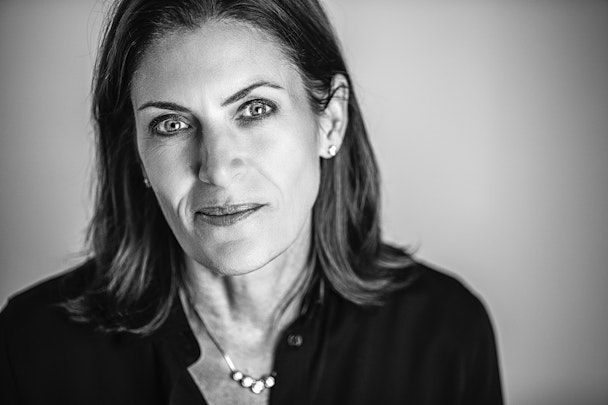Departing Dentsu boss Wendy Clark was the face of its future – without her, what’s next?
Three months ago, she was an unmissable presence on the Cannes Croissette relaunching Dentsu to the market and laying out her plans for its future. Now, she’s on her way out. What’s behind the sudden exit?

Dentsu boss Wendy Clark is set to leave the business / Dentsu
Wendy Clark is expected to step down from her post as Dentsu International's global chief executive officer in a shock departure for the Japanese holding company.
Though the timeframe of Clark’s exit is unknown, the news that it is on the cards at all has been enough to stun the industry. The agency leader had been in post for just two years, having been poached from DDB in April 2020, and was a high-profile member of the Dentsu contingent at this summer’s Cannes Lions where she announced the launch of its Dentsu Creative offering.
The former Coca-Cola and AT&T marketer has been at the forefront of Dentsu’s years-long restructuring project, joining the company after it commenced a grand effort to build a coherent, competitive organization out of 160 disparate agency businesses.
Advertisement
Greg Paull, principal at marketing consultants R3, tells The Drum: “It’s not easy to teach an elephant to dance. Wendy inherited a highly dysfunctional structure and tried her best to drive creativity and consistency through it.
“She will be truly missed as a strong global thinker for a Japanese-owned holding group.”
Clark’s tenure
Restructuring efforts began in late 2019 and continue today; in a November 2021 interview with The Drum, Clark said the company was “a third of the way through that journey”.
That process has seen thousands of job cuts across the group and the gradual merger of hundreds of agency brands into a collection of just six businesses. In June, she announced the merger of Dentsu International’s creative agencies into a single entity, Dentsu Creative, sunsetting around 100 historic corporate brands such as Mcgarrybowen in the process while providing a platform for poster-boy hires Ete Davies and Fred Levron, who joined the business late in 2021.
Vizeum, similarly, was merged with iProspect to create a huge digital performance agency bearing the latter’s name in 2021.
Advertisement
Key to the company’s hopes for the future is a focus on digital transformation services. Dentsu vowed previously that 50% of its revenues would come from digital, e-commerce and consulting services rather than traditional advertising.
Most of its acquisitions made under Clark have been intended to further that goal, including the $250m purchase of LiveArea in 2021 and Salesforce specialist Pexlify earlier this year. Also this year it reported that revenues from that sector had topped 30% for the first time – a cause for celebration at the group.
But client wins have been hard to come by. Despite Clark’s professional history with Coca-Cola, the brand opted for WPP in a review late last year. Carat’s retention of the $400m Vodafone business notwithstanding, it has failed to compete with holding company rivals in the biggest recent pitches, including Stellantis and Estée Lauder.
Suggested newsletters for you
Despite the much-publicized merger and rebrand of Dentsu Creative, R3 ranked the network 12th for estimated new business revenues this year, behind smaller groups such as M&C Saatchi. News of redundancies at Merkle adds a further bad omen into the mix. In contrast, other groups that have gone through restructuring programs, such as IPG, have had strong financial performance with a similar headcount to Dentsu’s.
With Dentsu’s own global ad spend predictions revised downwards this year, there may not be many significant opportunities for further growth remaining this year.
But the group struggled more than competitors during the pandemic; losses in 2020 rose to $1.3bn – a hole that it took 18 months to climb out of. Dentsu’s first half results for 2022 (a moment also helmed by Clark) finally returned it to growth.
So despite the talk of long-term plans and century-spanning sustainability schemes, it is growth that the group desperately needs now. Consider the brief statement on Clark’s departure released by a Dentsu spokesperson this morning: “A cross-functional global team of our executive leaders has been working on our long-term roadmap for Dentsu. We have strong confidence that this will continue our progress in driving growth and making client impact.”
Clearly, its ’long-term roadmap’ doesn’t include the current chief executive. Any successor would need to accelerate its growth – especially in the digital transformation sector to meet the company’s medium-term objectives – while working to conclude the company’s wide-reaching reorganization in a way that highlights its strengths to clients, rather than its weaknesses.

